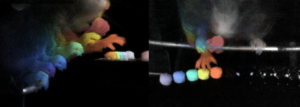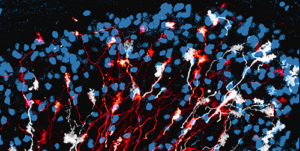
Skillful movements contribute to the major functions of the brain, such as perception and manipulation of the world. Skill involves understanding the world, developing appropriate plans, converting those plans into appropriate motor commands, and adaptively reacting to feedback. Considering the range of possible actions and the complexity of musculoskeletal arrangements, skilled motor control is an amazing achievement of the nervous system. The myriad of these underlying operations is likely performed by a diverse set of neural circuits. By combining anatomy, physiology, and specific (genetic and temporal) manipulations, we hope to identify and understand the neural elements responsible for skillful motor control. Currently, we focus on the role of the cortico-cerebellar loop in a learned reach-grab-eat task in the rodent.
